Long story short, yes the staff yells and curses at patients, they seem to have their own issues and in turn neglect the patients trauma and ptsd. Certain staff is very polite & helpful, while others are rude nasty mocking patients, making disgusted faces at some of them ...
About Carrier Clinic
Carrier Clinic accepts insurance providers including Medicare, Medicaid and many private insurance plans like Aetna, Cigna, Horizon Blue Cross Blue Shield and United Healthcare to make their services affordable to many people.
What sets this clinic apart is its commitment to aftercare. They ensure clients have access to outpatient services and support groups to maintain their progress long after their initial treatment ends. This facility is very useful for those who have dual diagnosis and need to treat both their psychiatric condition as well as the one that derives directly from dependency.
Detox services are also available to help those withdrawing from substance use. Medical personnel oversee this program to ensure that the experience is safe and manageable.
Medication assisted treatment is offered for adults in recovery from opioid addiction. MAT therapy combines FDA approved medications with counseling and behavioral therapy to keep cravings under wraps and support each client’s recovery journey.
Here, they use cognitive behavioral therapy, dialectical behavioral therapy and group therapy to teach coping skills. These services also help clients broaden their circle of support by surrounding them with others in the same or similar situations. If clients have very serious cases of clinical depression then the clinic can also offer electroconvulsive therapy. This service is usually offered only if the client has not responded favorably to other treatments.
The best part of Carrier Clinic is its emphasis on long term recovery. They offer programs to ensure that patients can easily access, sustain and maintain clinical care within their community. This way, they’ll have medical support long after they complete primary treatment.
Latest Reviews
Rehab Score
Gallery
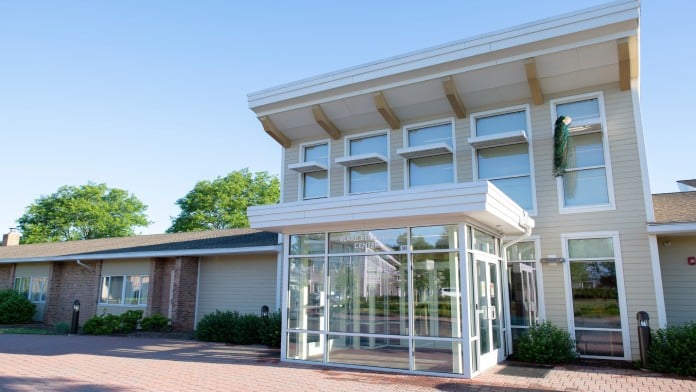
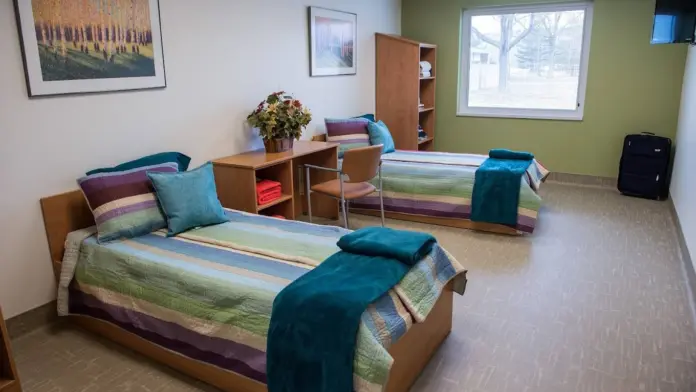
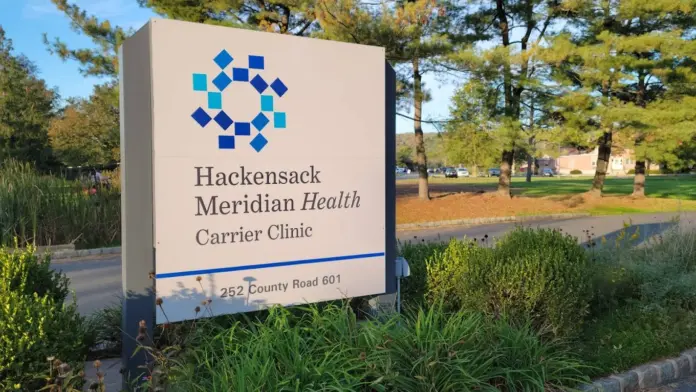
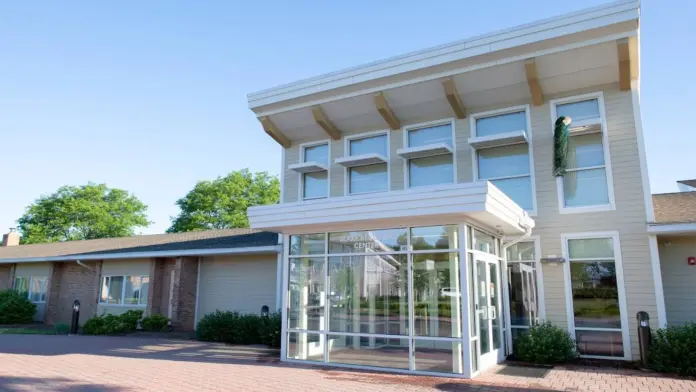
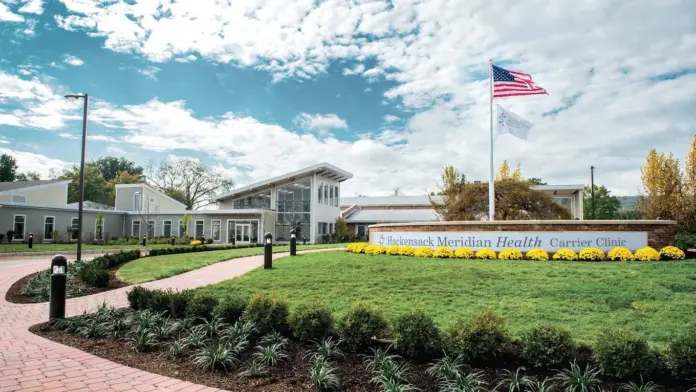
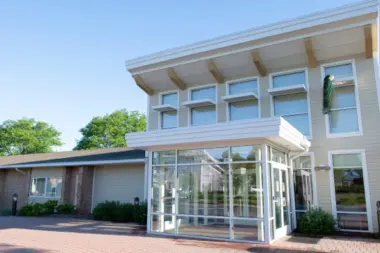
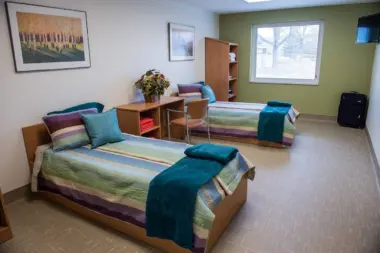
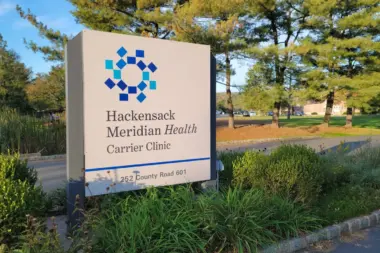
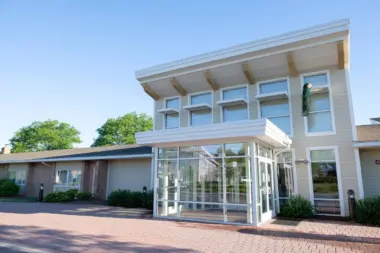
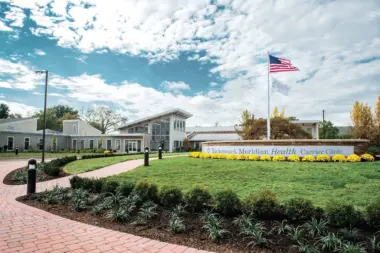
Other Forms of Payment
Private insurance refers to any kind of healthcare coverage that isn't from the state or federal government. This includes individual and family plans offered by an employer or purchased from the Insurance Marketplace. Every plan will have different requirements and out of pocket costs so be sure to get the full details before you start treatment.
Self-pay involves paying for treatment out of your own pocket. You can use savings or credit, get a personal loan, or receive help from family and friends to fund your treatment. If you don't have insurance or your insurance plan doesn't cover a specific program, self-pay can help ensure you still get the care you need.
Medicare is a federal program that provides health insurance for those 65 and older. It also serves people under 65 with chronic and disabling health challenges. To use Medicare for addiction treatment you need to find a program that accepts Medicare and is in network with your plan. Out of pocket costs and preauthorization requirements vary, so always check with your provider.
Military members, veterans, and eligible dependents have access to specific insurance programs that help them get the care they need. TRICARE and VA insurance can help you access low cost or no cost addiction and mental health treatment. Programs that accept military insurance often have targeted treatment focused on the unique challenges military members, veterans, and their families face.
Medicaid is a state based program that helps lower-income individuals and families pay for healthcare. Medicaid covers addiction treatment so those enrolled can use their coverage to pay for rehab. When a program accepts Medicaid the client often pays very little or nothing out of their own pocket.
Addiction Treatments
Levels of Care
Outpatient Programs (OP) are for those seeking mental rehab or drug rehab, but who also stay at home every night. The main difference between outpatient treatment (OP) and intensive outpatient treatment (IOP) lies in the amount of hours the patient spends at the facility. Most of the time an outpatient program is designed for someone who has completed an inpatient stay and is looking to continue their growth in recovery. Outpatient is not meant to be the starting point, it is commonly referred to as aftercare.
Their Psychiatric Inpatient Hospitalization Programs include: Adolescent Psychiatric and Dual Diagnosis (ages 13-18), General Adult Psychiatric and Dual Diagnosis, Psychiatric Acute Care, and Older Adult Psychiatric and Dual Diagnosis (ages 60+). For those who are admitted to their hospital, whether to the Adolescent, Adult Psychiatric, Adult Dual Diagnosis, or Older Adult Unit, stays generally tend to be brief, with the objective being crisis intervention, medical stabilization, and transition to the next appropriate level of care. Their npatient treatment teams consist of a psychiatrist, advanced practice nurse, psychiatric nurse, licensed clinical social workers, allied clinical therapists and certified addiction counselors who work closely with both the individual and family members to facilitate the fastest course of recovery.
Blake Recovery Center in Belle Mead is known for their effective alcohol detox program designed specifically for those suffering from alcoholism. The detox process can take up to a week, but varies based on the severity of addiction. Without proper medical treatment and supervision, detox and withdrawal can be extremely uncomfortable or painful, even dangerous. In their NJ drug detox and rehab center, their trained medical staff can mitigate the symptoms of withdrawal in a safe, comfortable environment.
At certain points in the recovery process, it's important to have support available 24/7. 24-hour clinical care offers a safe environment in which to recover from drug or alcohol addiction in peace, knowing medical detox and other treatment will happen with professionals on hand.
At Blake Recovery Center, a NJ addiction treatment center, their IOP program offers complete addiction and co-occurring disorder treatment to patients and their families when the severity of addictive disease does not require residential treatment. Intensive Outpatient programs are for those addicted to alcohol and drugs who are able and willing to commit to a structured program which requires regular attendance and active participation. IOP program hours are: Monday, Tuesday, and Thursday evenings from 6:30 pm to 9:30 pm. Participants are expected to comply with random urine drug screening and blood alcohol level testing. This insures honesty in the recovery process.
AA and NA state that by making 90 meetings in 90 days, you are on the road to long-term addiction recovery. Meeting with these groups enables patients to relate to others with similar struggles, tell their stories in a supportive environment, and get useful strategies that focus on continued self-help – so they can move on in everyday life knowing they are not alone. In addition to participating in meetings and support groups, they encourage their patients to focus on getting healthier through gentle exercise that helps heal the mind and the body.
Completing a drug or alcohol rehab program shouldn’t spell the end of substance abuse treatment. Aftercare involves making a sustainable plan for recovery, including ongoing support. You and your treatment team, including the psychiatrist, psychiatric nurse, addiction counselor, clinical case manager and mental health technician, will work together to determine an appropriate aftercare plan. The purpose of each Alumni program’s monthly meetings and special events is to support graduates in making the transition from treatment into recovering life by providing support, fellowship and encouragement. Blake Recovery Center Alumni group is open to any individual who completed their inpatient treatment at Blake Recovery Center.
Treatments
The goal of treatment for alcoholism is abstinence. Those with poor social support, poor motivation, or psychiatric disorders tend to relapse within a few years of treatment. For these people, success is measured by longer periods of abstinence, reduced use of alcohol, better health, and improved social functioning. Recovery and Maintenance are usually based on 12 step programs and AA meetings.
Drug rehab in New Jersey is the process of addressing the complex issues involved with addiction. Challenges are identified and addressed through individual and group counseling. Participants learn how to manage these issues without the use of substances.
For people with co-occurring disorders, Blake Recovery Center’s Dual Diagnosis Program in conjunction with Carrier Clinic offers specialized short-term critical care intervention, and utilizes group and individual therapies along with psychiatric medications. Their New Jersey dual diagnosis treatment center focuses primarily on providing individual and group counseling for patients with psychiatric disorders within a framework that gives particular attention to addictive and compulsive behaviors, which are often compounded by psychological issues.
A combined mental health and substance abuse rehab has the staff and resources available to handle individuals with both mental health and substance abuse issues. It can be challenging to determine where a specific symptom stems from (a mental health issue or an issue related to substance abuse), so mental health and substance abuse professionals are helpful in detangling symptoms and keeping treatment on track.
Opioid rehabs specialize in supporting those recovering from opioid addiction. They treat those suffering from addiction to illegal opioids like heroin, as well as prescription drugs like oxycodone. These centers typically combine both physical as well as mental and emotional support to help stop addiction. Physical support often includes medical detox and subsequent medical support (including medication), and mental support includes in-depth therapy to address the underlying causes of addiction.
Programs
Adult rehab programs include therapies tailored to each client's specific needs, goals, and recovery progress. They are tailored to the specific challenges adult clients may face, including family and work pressures and commitments. From inpatient and residential treatment to various levels of outpatient services, there are many options available. Some facilities also help adults work through co-occurring conditions, like anxiety, that can accompany addiction.
Young adulthood can be an exciting, yet difficult, time of transition. Individuals in their late teens to mid-20s face unique stressors related to school, jobs, families, and social circles, which can lead to a rise in substance use. Rehab centers with dedicated young adult programs will include activities and amenities that cater to this age group, with an emphasis on specialized counseling, peer socialization, and ongoing aftercare.
Recovery is most successful when clients feel accepted and validated by their peers and treatment providers. Facilities that offer LGBTQ-inclusive programming are committed to creating a safe space where everyone can grow and recover without fear of judgment or discrimination. They will have dedicated policies in place to create a safe and supportive environment that fosters free expression.
Serving in the military is both mentally and physically challenging, and can result in trauma that persists even after combat ends. Military programs are tailored to the specific and often complex needs of active duty personnel, veterans, and military families. Clients often access these programs through the U.S. Department of Veterans Affairs (VA).
Clinical Services
Cognitive Behavioral Therapy (CBT) is a therapy modality that focuses on the relationship between one's thoughts, feelings, and behaviors. It is used to establish and allow for healthy responses to thoughts and feelings (instead of unhealthy responses, like using drugs or alcohol). CBT has been proven effective for recovering addicts of all kinds, and is used to strengthen a patient's own self-awareness and ability to self-regulate. CBT allows individuals to monitor their own emotional state, become more adept at communicating with others, and manage stress without needing to engage in substance abuse.
Dialectical means opposing. The premise of dialectical behavior therapy is to learn how two things that seem to be opposite can actually be true. You learn how to accept yourself while also making changes. The focus is on accepting your emotions and changing how you manage them.
Group therapy is any therapeutic work that happens in a group (not one-on-one). There are a number of different group therapy modalities, including support groups, experiential therapy, psycho-education, and more. Group therapy involves treatment as well as processing interaction between group members.
In individual therapy, a patient meets one-on-one with a trained psychologist or counselor. Therapy is a pivotal part of effective substance abuse treatment, as it often covers root causes of addiction, including challenges faced by the patient in their social, family, and work/school life.
Motivational interviewing helps clients find their motivation to change. It can be an effective method to work with clients who are angry or hostile or feel insecure about their ability to make changes in their lives. It is often used during addiction treatment or to manage physical health conditions.
Trauma therapy addresses traumatic incidents from a client's past that are likely affecting their present-day experience. Trauma is often one of the primary triggers and potential causes of addiction, and can stem from child sexual abuse, domestic violence, having a parent with a mental illness, losing one or both parents at a young age, teenage or adult sexual assault, or any number of other factors. The purpose of trauma therapy is to allow a patient to process trauma and move through and past it, with the help of trained and compassionate mental health professionals.
Blake Recovery Center at Carrier Clinic provides free support groups for family members, significant others, and friends whose lives are impacted by another’s addiction. This includes a Weekend Codependency Program with therapeutic, educational, and guidance components. Recovering individuals may also attend. Components of the six-week series (though many continue to come after that time as needed) include educational lectures, discussion groups (including a parents group), informational videos, and the opportunity to meet with addiction treatment professionals.
Life skills trainings involve all the skills a person must have in order to function successfully in the world. These include time management, career guidance, money management, and effective communication. Truly successful addiction recovery is based on the ability to not only live substance-free, but to thrive. Life skills teaches the practical necessities of functioning in society, which sets clients up for success in life, and therefore sobriety.
Nicotine Replacement Therapy (NRT) is a way of getting nicotine into the bloodstream without smoking. It uses products that supply low doses of nicotine to help people stop smoking. The goal of therapy is to cut down on cravings for nicotine and ease the symptoms of nicotine withdrawal.
Amenities
-
Private Setting
-
Hiking
Staff & Accreditations
Staff
John Joseph Kindred
Founder
Donald J. Parker
CEO
Accreditations

State Licenses are permits issued by government agencies that allow rehab organizations to conduct business legally within a certain geographical area. Typically, the kind of program a rehab facility offers, along with its physical location, determines which licenses are required to operate legally.
State License: New Jersey

The Joint Commission, formerly known as JCAHO, is a nonprofit organization that accredits rehab organizations and programs. Founded in 1951, the Joint Commision's mission is to improve the quality of patient care and demonstrating the quality of patient care.
Joint Commission Accreditation: Yes
Contact Information
252 County Road Route 601
Belle Mead, NJ 08502